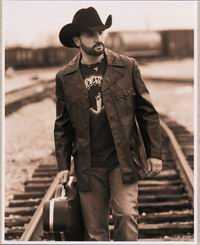When that voice rumbles out of the speakers like rolling thunder, it's obvious there's a different kind of cowboy on the scene, one who writes songs with the plainspoken poetry and emotional directness that turned the songs of Kristofferson, Jennings, and Nelson into a movement. And if you want to call Ray Scott an outlaw, well, he's alright with that.....
It's his attitude. He does it his way. He says it his way. His way takes aim at the heart, scoring a direct hit by chronicling the beauty and the tragedy of everyday life. He knows where country music's been and he knows that he's taking it someplace new. His way is the way of the steel guitar. It's recitation and gospel, with a little blues and rock thrown in for seasoning. But when it simmers to a boil and he serves it up in that deep Carolina drawl, you can't call it anything but country music.
That's because Scott comes by his country roots honestly. Raised in the rural farming community of Semora, North Carolina he grew up among the blue collar folks who populate his songs. He also grew up the son of a country singer. In fact, it's his dad, Ray Sr., he credits as his biggest musical influence.
"A lot of people name off artists as influences and I have those too, but the biggest impression on me was my dad," says the Warner Bros. Nashville newcomer. "He was a singer and I heard his interpretations of all those great country songs growing up. I realize more all the time that listening to his versions and comparing them to the originals I heard on the radio taught me a lot about how to make a song your own."
The father's dream of musical success was soon officially passed down to the son, and after a youth spent soaking up his Daddy's music, Ray began to find himself drawn to the authority and gritty realism of Johnny Cash, Waylon Jennings, Willie Nelson, and Merle Haggard. "Those guys defined an era of country music," he says. "They left a permanent impression on me that I wear like a badge of honor. I loved the realness of their music. That stuff will always be great, always stand up to time. Those old boys meant what they were saying. They lived it."
Ray loved great vocalists, but found himself drawn even more intently to artists who write their own songs. "You listen to their music and you get who they are," he says of his affinity for songwriters, especially those who weren't afraid to buck the system. "You feel like you know them. I respect the guys like Kris Kristofferson who said what they had to say and didn't compromise because of what was going on in the industry at the time."
With so much surrounding him, a music career was almost inevitable. By the time he was 19, he'd formed his first band in Raleigh, North Carolina. That band promptly fell apart because, among other reasons, none of the members had much music business savvy. Realizing he needed to learn a few things if he wanted a career instead of a hobby, Scott moved to Atlanta and got an Associate's degree from the Music Business Institute.
He moved back to Raleigh after graduation and started another band. All the while, he kept getting advice to move to Nashville to advance his career. It took a near-mystical experience, however, for him to finally make the move.
"A buddy and I were on our way back to Raleigh from a road trip," he explains. "I was driving through Nashville and I looked out over the skyline and got this really strange feeling. It was like a moment of clarity, telling me this was where I needed to be. Something seemed to saying, "No need thinking anymore about it, your mind's made up." Within another six months, I was here...
Like most young writers who move to the songwriting capital of the world, it didn't take long for him to realize he was as green as a gourd. He still had a lot of learning to do, so he dug his heels in and began writing in earnest. He studied the craft of songwriting, trying to learn everything he could about what makes a great song great. Eventually, his music caught the ears of noted producers Norro Wilson and Buddy Cannon, who cut several tracks on him, hoping to score a record deal. That deal never materialized, but the experience was golden.
People began to pay attention the name Ray Scott and he landed a publishing deal with Tom Collins. The years of dedication to his craft finally began to pay off when Randy Travis ("Pray for the Fish") and Clay Walker ("A Few Questions") had hit singles with his songs.
However, it was the hard-driving, attitude-drenched "Plowboy" that changed things for the better. It was the song that became his calling card, the one that prompted Paul Worley at Warner Bros. to give the green light on a record deal. It also knocked down the door of creativity and cleared the way for a batch of songs sure to establish Scott as a working class poet of the highest order.
The songs on his Warner Bros. debut, My Kind of Music, range from odes to the working man ("Dirty Shirt") and gut-wrenching ballads ("Fly With an Angel") to morning-after regrets ("Bear With Me Lord"). Mix in the earthy sensuality of "I Didn't Come Here To Talk" and personal manifestos like "Different Kind of Cowboy" and "My Kind of Music" and you've got all the ingredients of a classic album. One that will, like those of his heroes, stand the test of time. An album that will show country fans the world over that he's a different kind of cowboy. One who's always true to his roots, his heart, and his music. One you won't soon forget.
